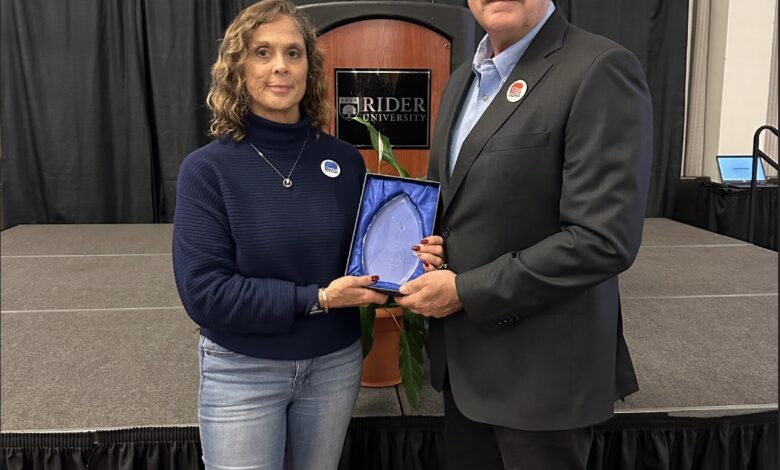
Rider hazing death covered in new docuseries
By Amethyst Martinez
Last February, Julie DeVercelly stepped foot inside Lake House on Rider’s campus for the first time. It was the place her son, Gary DeVercelly Jr., was hazed to death after participating in a ritual with fraternity Phi Kappa Tau almost 16 years prior in March 2007.
It ended up being not at all what she was expecting. The dorm hall, now home to freshmen performing arts students, was filled with singing, piano playing and students flowing in and out.
It was a scene in which she described as “joy.”
On Sept. 25, at a viewing of a documentary on Gary Jr.’s life and death in the Cavalla Room, Julie and Gary DeVercelly Sr., Gary Jr.’s father, were awarded the Rider University Sesquicentennial Medal of Excellence for their work in anti-hazing activism, not only at the university, but nationally. While walking up to receive the award after the documentary, Julie hugged a crying Greek life student moved by Gary Jr.’s story.
The family of Gary Jr., from Long Beach, California, has dedicated their lives to the work of anti-hazing efforts after his death, from campaigning in Washington, D.C., to being board members of the Clery Center, a national nonprofit dedicated to promoting the Clery Act and campus safety across the country.
But, the fight continues
Currently, the DeVercelly’s are among a plethora of activists personally affected by the dangers of hazing who continuously rally not only for institutional change at universities, but fighting to include these efforts in legislation.
Now, they are rallying for the Stop Campus Hazing Act, once introduced as the REACH (Report and Educate About Campus Hazing) Act, which currently has bipartisan support.
Along with legislative work, the DeVercelly’s work closely with high schools and universities to spread awareness on hazing.
Their activism doesn’t stop there, however.
‘Protect the House’
The family will soon be a part of a docuseries yet to be released entitled, “Protect the House,” which has been a four-year long endeavor for the DeVercelly’s. The family, along with the Clery Center, also produced an award winning documentary in 2014 entitled, “We Don’t Haze.”
Director Daniel Catullo said that the new docuseries is over eight hours long, and is still being filmed, covering multiple families and the dangers of hazing. As part of their visit to campus, the family, along with Catullo, interviewed current Lake House students in the dorm hall which Julie described as a stark contrast from the way she envisioned.
Once a place of grief for the DeVercelly’s, Lake House has a newfound meaning, permanently marked with a photo of Gary Jr outside its front doors.
“I didn’t realize the impact that seeing the house and all the happiness would have on them,” said Catullo.
Catullo and the parents of Gary Jr. praised Rider’s reaction to his death in recent years, citing that schools where similar instances of hazing have occurred have tried to move past the tragedies.
“Could Rider all of a sudden [have] stumbled into a possible solution?” said Catullo in regards to Rider’s response to Gary Jr. ‘s death. “Bringing your Greek life down to a manageable size, developing a strong relationship with your Greek life personnel. … This is a much different campus than it was 30 years ago or even 15 years ago, and so, maybe, Rider could hold the key.”
Debbie Stasolla, a Rider cabinet member who played a key role in keeping the relationship alive with the DeVercelly’s over the past 16 years, said that, although the relationship began rocky due to the circumstances, the family worked closely with the university when restructuring Greek life on campus.
“They knew they needed to make changes, because it should have never happened,” said Julie. “[Students] are all reaping the benefits of a much safer environment for all.”
The DeVercelly’s travel across the country to visit campus often, whether Rider officials know it or not.
“We know Gary [Jr.] loved this place, he was excited to be here. So I hold onto that,” said Julie. “By continuing to acknowledge what happened here, and continuing to address the problem, it’s continuing to evolve.”


